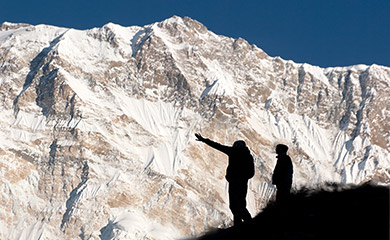
I recently wrote about an experience I had trekking in Nepal and how its lessons apply to leadership. Another powerful lesson came to me when I was sick, scared and alone in a remote village in the foothills of Mt. Everest.
Ask for help
The village of Namche Bazaar is one of the most unusual places I’ve ever visited. While it is several days walk from the nearest dirt road and is really in the middle of nowhere in the foothills in the Mount Everest region, it boasts some unexpected luxuries—electricity, a German konditorei coffee shop, and a number of outdoor gear shops that have surprisingly advanced equipment like Russian titanium oxygen bottles and enormously warm down sleeping bags. It is a launching point for Everest expeditions and other trips into the high-altitude country of the Himalayas.
I spent a few nights in Namche Bazaar acclimatizing and waiting for my hiking partner, who was going to join me there. I began to develop a cough along with some of the stomach issues that invariably come with a trip to that part of the world. I knew that I didn’t have a cold, but the cough got worse and I began to worry. And as I sat there alone, my mind began to play tricks on me. I wondered if I was developing pulmonary edema, a potentially fatal lung condition associated with high altitude.
I tried to tell my porter that I wanted to see a doctor. He explained in very limited English that the doctors in that village were“very bad,” and the nearest good doctor was a day’s walk away. Now seriously concerned, I told him maybe we should go ahead to that other village. He nodded and then went off to bed, totally ignoring what I said. I realized that his English was even more limited than I thought, and he really had not understood what I was saying.
Afraid and confronted with the prospect of only a “bad doctor” if I really was sick, I decided to take a chance and knock on a couple of doors of other people who were staying in the same small mountain lodge. I knocked on the first door not even knowing if I would get someone who could speak English.
A woman opened the door, and I explained my plight. She asked about my symptoms, which I shared. “I am a high-altitude guide,” she said, and she invited me in. I talked more about my symptoms, and after patiently hearing me out, she put my fears to rest. “It’s very common,” she said, “to develop a cough like the one you have in this area because the altitude creates a very dry environment, and people develop that cough because of the dust. It even has a name. It’s called the ‘Khumbu cough,’ named after this region of the Everest foothills.”
I don’t recall ever having a more powerful wave of relief than the one I felt as I went back to my room knowing that I wasn’t going to die either from some horrible medical condition, or at the hands of a bad doctor!
It doesn’t have to be lonely at the top
Applying this little anecdote to leadership, I would simply ask: how many of us try to face our leadership challenges alone? We each need a network of trusted friends, colleagues, advisors and partners whom we can go to with different kinds of issues. They say it’s lonely at the top, but I don’t think it needs to be. To be successful and to grow—and keep growing—we all need to ask for help. Who will you ask for help today?